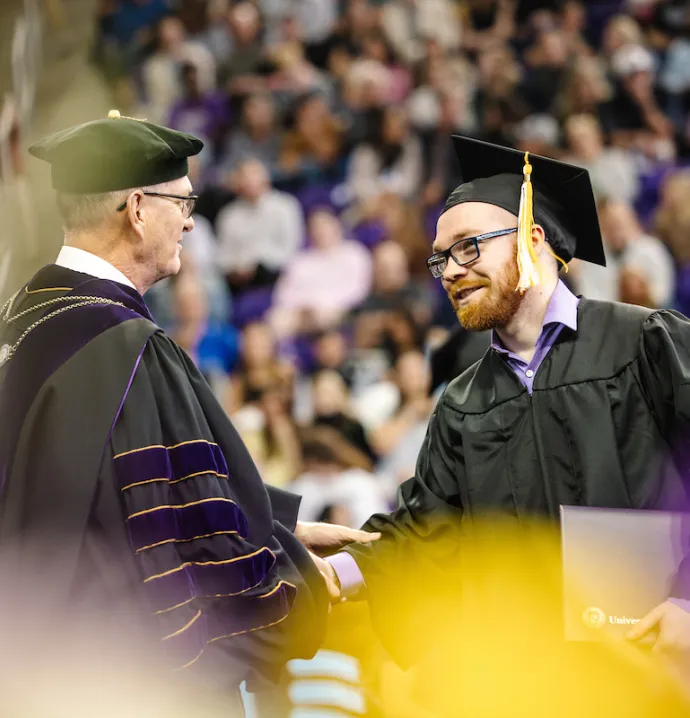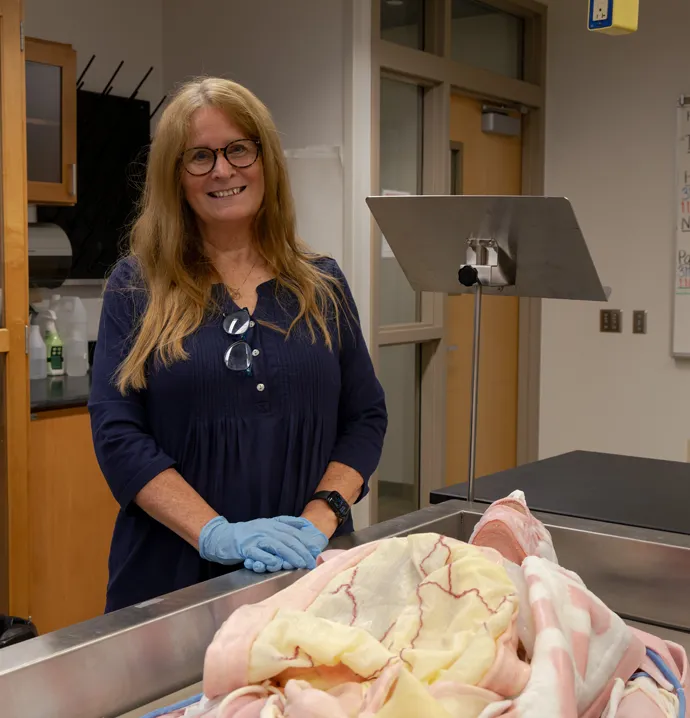With state's first master's degree program, UNI athletic training makes big impact
With state's first master's degree program, UNI athletic training makes big impact
Paige Mathews always knew she wanted to help others. She was pursuing a nursing degree when she unexpectedly discovered her true calling while taking a prerequisite athletic training class.
“I went in and I thought, ‘I’m just gonna’ go and tape some ankles and watch people on the sidelines. It’s gonna’ be so boring,’” said Mathews, now in her second year of graduate studies in UNI’s athletic training program. “Now, I’m still surprised every day of what athletic trainers can do.”
In 2018, UNI became the first Iowa university to provide an accredited professional master’s degree in athletic training. (UNI previously offered a professional bachelor's and post-professional master’s degree.) Mathews is the first student scheduled to graduate from the program, which she’ll do in a virtual ceremony in May.
UNI’s athletic training program is a central hub in the Cedar Valley industry with graduates working in clinics, high schools and hospitals across the region. Others have made their mark across the country, including on NFL teams.
For Mathews, it was UNI’s reputation for providing a rigorous education and hands-on experience — including in clinical and community healthcare settings — that led her to transfer from the Missouri school where she was studying nursing.
“There are so many opportunities available at UNI. I’ve worked with people at the collegiate level, high school level, I’ve been in an orthopedic office,” she said. “I have learned way more than I ever thought I would in two years. With this athletic training program, I know that I’m going to have a career out of it.”
Those local connections and UNI’s reputation have only become more important in recent weeks as large swaths of the US economy have shut down to slow the spread of coronavirus. Athletico Physical Therapy, one of the program’s community partners, is providing students the opportunity to gain clinical experience from preceptors that have launched their telemedicine service in response to COVID-19.
“They rolled out their telehealth within a week’s time to continue providing excellent patient care and our students have the opportunity to be a part of something extremely unique,” said UNI assistant professor of athletic training Tricia Schrage. “They are providing a once in a lifetime opportunity for these students, because they will be engaging in authentic experiences with preceptors that are using telemedicine and adjusting their practice to meet the needs of their patients.”
Schrage knows first-hand how the field has changed throughout the years — and how UNI’s program is quick to adapt. She holds a master of science and bachelor of arts in athletic training from UNI. The industry — and the associated college courses — have seen an increased focus on the specialized healthcare aspects of the job, and other industries are taking notice of the depth and breadth of skills athletic trainers have.
“We’re seeing these little pockets open up for athletic trainers that were not historically present. That entails performing arts, the military and governmental agencies,” said Schrage. “For example, the DC Police Academy has a full time athletic trainer employed to treat injuries, decrease days lost to injury, and ultimately save money. People see the value in employing athletic trainers.”
UNI graduates say the athletic training program has been a springboard to a successful career. Destry Sperfslage graduated from the undergraduate program in 2012 and went on to get a master’s elsewhere before working with the Denver Broncos. He decided to return to Iowa and now works as director of sports medicine and wellness at Taylor Physical therapy and is the head athletic trainer at Waverly-Shell Rock High School.
“My education at UNI has exposed me to the demands of the profession, as well as the base knowledge needed to develop and grow as a healthcare provider,” he said. “I think now requiring a master’s degree will only improve the efficacy of what we are trying to accomplish as a profession, to earn respect as providers in our field.”
UNI offers students a number of clinical experience opportunities. Students can complete a portion of clinical experience hours on campus at UNI’s Human Performance Center (HPC), which is home to UNI’s main athletic training facility, Cedar Valley Physical Therapy, and Cedar Valley Medical Specialists’ Department of Orthopedics and Advanced Diagnostic Imaging.
These healthcare entities, along with several others, work with the Cedar Valley community and provide athletic training students the opportunity to work with their clients as well as UNI student athletes. Getting this variety of experiences has been one of Mathews’ favorite parts of her studies, and it’s helped her feel prepared for her future career.
The new master’s program also has led to changes in the undergraduate degree, which no longer leads to certification and now provides more foundational education in areas like anatomy, orthopedic injury assessment, pathology, and therapeutic interventions, along with courses in the natural sciences. As the industry shifts to a larger focus on in-depth training for healthcare professionals, the undergraduate degree gives foundational knowledge to help transition students to the professional master’s program — and a successful career.
“I think that’s one of the biggest challenges for any athletic trainer, transitioning from their education into their professional practice,” said Schrage. “Everything that we do is keeping in mind, ‘How can we transition them to practice so they are competent and confident medical providers when they’re out in the field?’”
The hands-on learning opportunities provided at both the undergraduate and graduate levels help students make the transition — and see the impact of their work first-hand.
“With our clinical rotations, you see how what you learn in the classroom becomes practical in the real world,” said Sperfslage. “The biggest advantage I felt I was exposed to is seeing the big picture of how our profession interacts amongst all other healthcare providers in working to provide the best care for the patients we serve.”
Mathews recalled working with star student athletes who sustained injuries that made them doubt whether they’d be able to return to the field. But getting athletes back in top form is what athletic trainers do — and what motivates many of them to do this work.
“I always knew I wanted to help people in some way,” said Mathews. “Seeing an athlete go from getting injured to going back to play is so inspiring. Sometimes it takes weeks, sometimes it takes months, but you are there every single step of the way. It feels good.”




